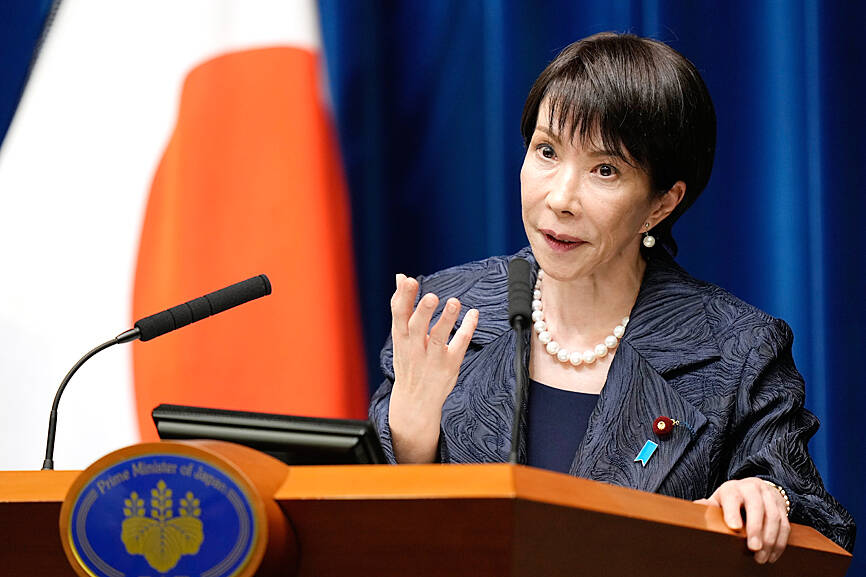Taiwan should maintain communications with Japan, as Japanese Prime Minister Sanae Takaichi is to lead a revision of security documents, Taiwanese academics said yesterday.
Tensions have risen between Japan and China over remarks by Takaichi earlier this month that the use of force against Taiwan would constitute a “survival-threatening situation” for Japan.
Prospect Foundation president Lai I-chung (賴怡忠) yesterday said Takaichi’s stance regarding Taiwan is the same as past Japanese prime ministers, but her position is clearer than that of her predecessors Fumio Kishida and Shigeru Ishiba.

Photo: AP
Although Japan views a “Taiwan contingency” as a “survival-threatening situation,” which would allow its military to be mobilized, that does not mean Tokyo would directly assist Taiwan’s military operations, Lai said.
Instead, it would mean Japan would have a more direct role within the security framework of the US-Japan alliance, requiring Tokyo to fulfill corresponding duties and actions, he said.
Taiwan should offer “moral support” for Takaichi, Lai said, adding that the nation should also maintain communications with Japan, as Takaichi is to lead the revision of three security documents that reflect the direction of Japan policy.
The three documents are the National Security Strategy, the National Defense Strategy and the Defense Build-up Plan.
Meanwhile, National Sun Yat-sen University Institute of China and Asia-Pacific Studies director Kuo Yu-jen (郭育仁) said security legislation implemented by Japan in 2015 mandates that national policies must promote the greatest welfare of the people.
Takaichi’s response to the question, “If China uses force to invade Taiwan and blockades Taiwan, and the US military comes to its aid, would this meet the conditions for exercising collective self-defense?” was made from a legal perspective, Kuo said, adding that it was not a new policy, but an interpretation of existing legal framework and consistent with the stance of former Japanese prime ministers.
As for China-Japan relations, he said: “It can’t be reversed.”
Chinese authorities would adopt a long-term and comprehensive pressure strategy, primarily to prevent a “domino effect,” Kuo said.
If China allows Japan to speak this way, neighboring countries such as the Philippines, Vietnam or South Korea might follow suit, he said, adding that Beijing also aims to prevent an internal “domino effect” within Japan.
The next Japanese leader could make the same remarks as Takaichi, which China would certainly not tolerate, Kuo said.
China’s future retaliatory measures would be more severe and diversified, he said, adding that the scale of its military exercises might expand and move closer to Japan.
The sanctions could extend from agricultural and fishery products to industrial goods, and large-scale anti-Japan protests might take place in the coming months, Kuo said.

The manufacture of the remaining 28 M1A2T Abrams tanks Taiwan purchased from the US has recently been completed, and they are expected to be delivered within the next one to two months, a source said yesterday. The Ministry of National Defense is arranging cargo ships to transport the tanks to Taiwan as soon as possible, said the source, who is familiar with the matter. The estimated arrival time ranges from late this month to early next month, the source said. The 28 Abrams tanks make up the third and final batch of a total of 108 tanks, valued at about NT$40.5 billion

Two Taiwanese prosecutors were questioned by Chinese security personnel at their hotel during a trip to China’s Henan Province this month, the Mainland Affairs Council (MAC) said yesterday. The officers had personal information on the prosecutors, including “when they were assigned to their posts, their work locations and job titles,” MAC Deputy Minister and spokesman Liang Wen-chieh (梁文傑) said. On top of asking about their agencies and positions, the officers also questioned the prosecutors about the Cross-Strait Joint Crime-Fighting and Judicial Mutual Assistance Agreement, a pact that serves as the framework for Taiwan-China cooperation on combating crime and providing judicial assistance, Liang

A group from the Taiwanese Designers in Australia association yesterday represented Taiwan at the Midsumma Pride March in Melbourne. The march, held in the St. Kilda suburb, is the city’s largest LGBTQIA+ parade and the flagship event of the annual Midsumma Festival. It attracted more than 45,000 spectators who supported the 400 groups and 10,000 marchers that participated this year, the association said. Taiwanese Designers said they organized a team to march for Taiwan this year, joining politicians, government agencies, professionals and community organizations in showing support for LGBTQIA+ people and diverse communities. As the first country in Asia to legalize same-sex

MOTIVES QUESTIONED The PLA considers Xi’s policies toward Taiwan to be driven by personal considerations rather than military assessment, the Epoch Times reports Chinese President Xi Jinping’s (習近平) latest purge of the Chinese People’s Liberation Army (PLA) leadership might have been prompted by the military’s opposition to plans of invading Taiwan, the Epoch Times said. The Chinese military opposes waging war against Taiwan by a large consensus, putting it at odds with Xi’s vision, the Falun Gong-affiliated daily said in a report on Thursday, citing anonymous sources with insight into the PLA’s inner workings. The opposition is not the opinion of a few generals, but a widely shared view among the PLA cadre, the Epoch Times cited them as saying. “Chinese forces know full well that